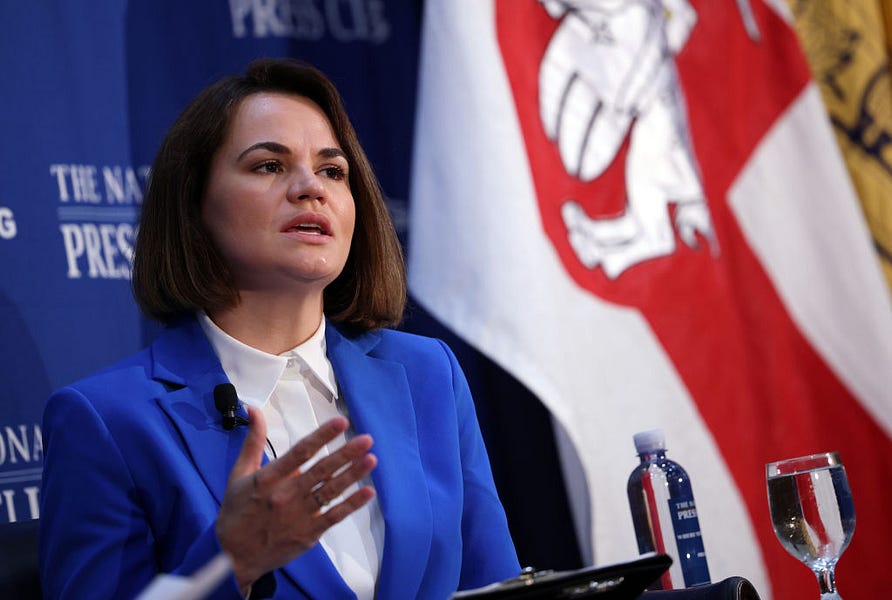On Sunday, red and white flags dotted Freedom Plaza as members of the Belarusian diaspora in Washington, D.C., gathered to welcome Svetlana Tikhanovskaya, the 39-year-old leader of the Belarusian opposition movement.
“We will not stop fighting until Belarus is free,” one speaker, a representative of the human rights organization Amnesty International, exclaimed.
When Tikhanovskaya’s car pulled up to the rally, the crowd gave her an enthusiastic welcome, flocking to the side of the road to see her disembark.
“It is a great achievement to be here and receive support from the United States,” Tikhanovskaya told the audience. “But I ask you to remember that our path towards freedom is long and challenging. We must always remember those who sacrificed their lives fighting for us and helped those fighting and now are jailed. I’d like to thank you Belarusians for your hard work, for your rallies, for your demonstrations, online campaigns, and support through solidarity funds. You’ve done a lot and I believe we could do even more.”
As many of the speakers at the event noted, it’s been almost a year since Alexander Lukashenko declared himself the winner of a presidential election that the international community condemned as fraudulent. Tikhanovskaya, who almost certainly received more votes than Lukashenko at the time, has become an international symbol of the fight for democracy in one of the least free countries in Europe.
While the political situation in Belarus has continued to deteriorate, a state of affairs exemplified by Belarusian authorities raiding the offices of an independent news organization and arresting three journalists last week, Tikhanovskaya’s visit to the U.S. has her supporters hopeful that something will change soon.
Alesya Semukha, a Belarusian émigré from Minsk who now lives in McLean, Virginia, said she was encouraged to see so many young people turn up to support Tikhanovskaya in Washington.
“I think that Svetlana’s visit shows that we’re making progress,” she explained. “When I was young and witnessed the collapse of the Soviet Union, my dad told me, ‘Rejoice, but prepare for a marathon.’ What he meant was it takes a long time to see progress sustained. … We still have a long way to go, but seeing so many people, hearing them, seeing our flag—our white-red-white flag—hearing them chant ‘Žyvie Biełaruś!’ [“Long live Belarus”], it just gives me hope.”
As Tikhanovskaya gave her address, rally goers waved flags and posters to show their enthusiasm. “MARCH AGAINST TERROR IN BELARUS,” read one sign. Another showcased what has become a rallying cry for the Belarusian opposition: “Verim Mozhem Peremozhem” (We believe, we can, we will win).
The day after Tikhanovskaya’s rally, I met with her in the Willard Intercontinental, a hotel right next to the White House. It wasn’t hard to see why people in Belarus have gone to such extraordinary lengths to support her campaign. Whereas Lukashenko has always striven to project a “tough-guy” image—playing hockey, brandishing a rifle, embracing his role as dictator—Tikhanovskaya is humble and soft-spoken, but with an edge of determination in her voice.
“Sometimes I’m exhausted,” she admits. “But when that happens, I remind myself of all those people who are behind bars. They don’t have [the] opportunity to fight, and they rely on me.”
One of those behind bars is her own husband, Sergei Tikhanovsky, who was arrested for “organization or preparation of a grave breach of public order” in May 2020. Authorities initially sentenced Tikhanovsky to 15 days in prison, but that term has been extended multiple times, and he now faces up to 15 years in prison if convicted in his ongoing trial in Minsk. Tikhanovsky first appeared in court on June 24, but the proceedings are closed to the public, as well as to foreign diplomats and independent journalists. A note of pride creeps into Tikhanovskaya’s voice as she describes her husband’s efforts to fight back against the notoriously corrupt Belarusian legal system.
“He’s a very strong person and he’s very active on the trial. He’s arguing with the judges, he’s defending himself though he doesn’t have to because he’s an innocent person,” she says. “He understands that everything is politically motivated, and he didn’t do anything wrong.”
The non-profit human rights organization Freedom House—which releases annual reports assessing the state of civil liberties in each country—describes Belarusian courts as “entirely subservient” to Lukashenko and the lack of independent judicial oversight as enabling police to “routinely and massively violate legal procedures.” According to Viasna, a human rights organization based in Minsk, Tikhanovsky is one of more than 550 political prisoners currently being detained by Belarusian authorities.
Tikhanovskaya repeatedly emphasizes the plight of these detainees as the reason for her advocacy.
“It’s so hot in Belarus right now, and cells are overcrowded, no fresh air. People are suffocated, and [there’s] no normal food, no shower, no pillows—people have to sleep on the floor,” she explains. “And those who are getting in prison now—they are treated very badly. They are humiliated physically and morally. [The authorities] say that you are [a] political prisoner, you are going to die.”
Belarusian authorities even detained Tikhanovskaya herself last August. She recalled how military officials in Belarus forced her to give a recorded concession speech calling on Belarusians to accept Lukashenko’s official results and stop protesting. “[Authorities] threatened me [using] my children,” she says. “And at that moment, I made my choice—my inner mother prevailed in me.”
Shortly after conceding the election, Tikhanovskaya fled to Lithuania, where she posted a heartfelt address to her followers on YouTube. In the video (recorded in Russian), Tikhanovskaya explained that the decision to leave her home country was one she made alone. “You know, I thought this campaign had really toughened me and had given me the strength to cope with anything,” she explained. “But I guess I’m still the same weak woman I was at the beginning.”
The idea that a woman was too weak to lead Belarus was one Lukashenko repeatedly attempted to exploit during the campaign. When asked whether he would debate Tikhanovskaya, Lukashenko insinuated that her proper place was in the kitchen. “She’s just cooked a tasty cutlet, maybe fed the kids, and the cutlet smells nice. And now there’s supposed to be a debate about some issues. What are we talking about?"
In a July 2020 interview, Lukashenko was even more blunt. “Society is not mature enough to vote for a woman,” he said. Taking on the responsibilities of president would cause her to “collapse, poor thing.”
A year later, Tikhanovskaya’s visit to the U.S. highlights the irony in those words. As Lukashenko has struggled to stay in power—relying on police crackdowns and support from the Russian government to combat domestic and international consensus about the illegitimacy of his government—Tikhanovskaya has become the de facto spokeswoman for the Belarusian people. And as she explains, her strength comes from her supporters—something Lukashenko appears to have way fewer of.
When I asked her what changed after she recorded the YouTube video last August, Tikhanovskaya explained, “I didn’t give up because I found strength in myself to continue this fight. Though I was in exile, what [was] most important is that Belarusians supported me. They didn’t take my escaping from the country as betrayal, they supported me still and they believe in me, and that gave me strength to continue.”
Now, Tikhanovskaya says the way to enact change in Belarus is to put pressure on the people who are enabling Lukashenko to remain in power. “[Lukashenko is] cruel, he takes revenge on everybody, but those who are beside him should understand that he is over, and it’s not rational to continue supporting him,” she explains. “The regime is afraid—afraid of betrayal, afraid of people, afraid of other countries, so I’m sure we will come to the point when it will be evident for everyone that [there’s] no future with Lukashenko.”
As for Russia’s ongoing role in Belarus, Tikhanovskaya stresses that the alliance between Lukashenko and Putin is a tenuous one. “The Kremlin would like to abuse Lukashenko’s weakness … but of course it’s a fake friendship. It’s nothing about reality. They are playing this game because for [the] Kremlin it’s not convenient that changes will come to Belarus through revolution and uprising.”
While Tikhanovskaya says Belarus has a “good relationship” with the Russian people, she is clear in her message to the Kremlin: “Stop meddling into our politics. Stop supporting Lukashenko’s regime.”
One of the points Tikhanovskaya emphasizes in her international advocacy is the distinction between Russia and Belarus. “Many countries started to perceive Belarus as part of Russia, and I had to explain that we are not. We are a separate country, [with a] separate language and separate culture, and it’s only because of Lukashenko’s regime that you perceive us as [an] appendix of Russia. We are not, and it’s not up to Russia how the situation in Belarus will change.”
At Tikhanovskaya’s rally on Sunday, activists from Cuba, Venezuela, and Ukraine took the stage to express solidarity with the Belarusian opposition. One of my final questions to her during our interview was about how she perceives the struggle for freedom in Belarus in relation to these other movements.
After a moment of reflection, Tikhanovskaya was frank. “I support all those people who are trying to fight for changes for better in their countries, and you have to support each other,” she says. “The world is losing its sense of democratic values … and strong democracies for sure have to be champions in supporting those who want changes.”
For her part, however, Tikhanovskaya says she is singularly focused on Belarus. “Other countries have a completely different context … and we have to concentrate on our fight.”






Please note that we at The Dispatch hold ourselves, our work, and our commenters to a higher standard than other places on the internet. We welcome comments that foster genuine debate or discussion—including comments critical of us or our work—but responses that include ad hominem attacks on fellow Dispatch members or are intended to stoke fear and anger may be moderated.
With your membership, you only have the ability to comment on The Morning Dispatch articles. Consider upgrading to join the conversation everywhere.